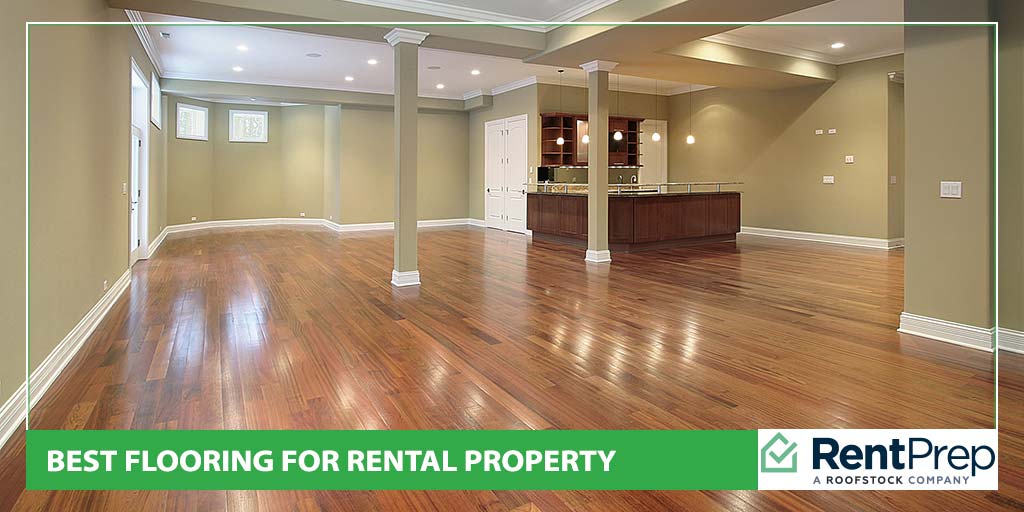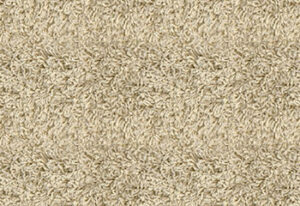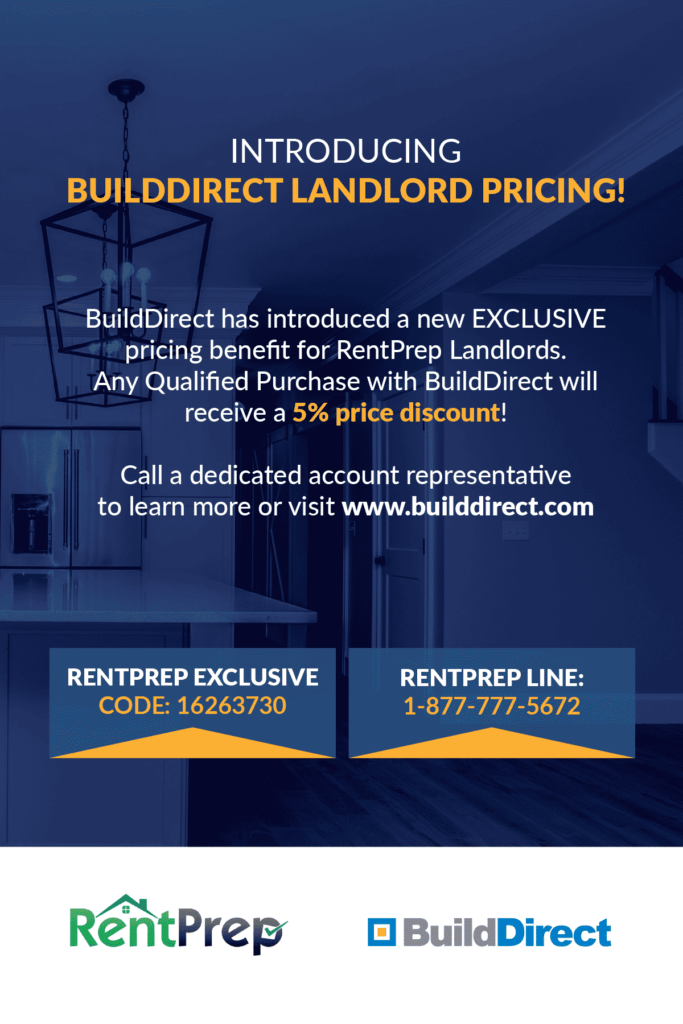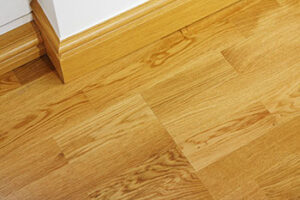
When trying to decide on the best flooring for rental property there are three main factors to consider.
- Price
- Durability
- Design
The best flooring for rental property is also going to be determined by the room. We will focus on two main ares in this guide:
- Kitchen & Bath
- Living room/Bedrooms
Different flooring is best suited for different parts of the property, and most landlords know that carpet in the bathroom is a bad idea.
However, flooring products have come a long way in recent years with advanced technology and new innovations, so landlords have more choices than ever. That being said, landlords need to choose the flooring that is best for the property, and not necessarily what they would select for their own homes.
One of our preferred partners (Build Direct) makes it easy to talk with a specialist to know what flooring works best for your rental. You can save money by cutting out the middle-man and they have a customer support line to answer any questions on flooring 1-877-777-5672. If you do order flooring, you can save 5% with code #16263730
Carpet – Best for Rental Property Living Rooms

Pros: Easy to install and one of the most affordable options for flooring in a rental property. Carpet is also soft, warm and welcoming. Another advantage about carpet is that the padding and the fibers keep the noise down, especially in multi-unit properties.
Cons: Carpet needs to be cleaned frequently by a professional service. Also, it wears out faster than some other flooring options and may not be the best choice for high traffic areas. Because it holds onto moisture, it’s not a good idea to install in bathrooms and kitchens. It can also harbor allergens, dust and even small pests like fleas. Tears, stains, and burns are not easy to fix or repair.
Note: Carpet can vary widely in cost when you’re looking at different options. Try and find a carpet that uses a durable material such as nylon. Also, yarn twist is a good metric to look at which refers to how many twists of yarn there are per square inch. The higher the twist metric the more durable the carpet. A sales associate at a carpet specialty store should be able to advise on the best carpet for rental property.

LVT – Luxury Vinyl Tile (RentPrep’s pick for kitchen & bath)
Pros: This is an extremely popular tile for rental properties. It is very durable and easy to install. Some landlords prefer the glue down versions but we prefer the click LVT that acts as a floating floor above your baseboard. This is popular in kitchens and bathrooms as it won’t allow water to penetrate it and won’t be scuffed easily.
Cons: This is a harder surface so noise will bounce more and some LVT can be more costly depending on the style you’re going for.
Vinyl

Pros: Extremely popular and quite affordable, vinyl is part of the resilient flooring group. It is highly versatile and moisture resistant, making it ideal for bathrooms, laundry areas and kitchens. It’s moisture resistant and easy to clean with standard. Vinyl is softer for the feet than other options like tile, stone and wood and absorbs noise better than the other materials. Vinyl also comes in a wide range of colors and patterns, from faux tile to imitation stone and wood. Sheet vinyl, solid vinyl tile and luxury vinyl tile are all options with different prices.
Cons: Vinyl can be gouged by sharp objects or ripped if furniture is dragged across it. Nicks, rips and cuts can’t really be repaired in sheet vinyl, while vinyl tile fares better. Vinyl is also difficult to remove and replace if the property owner wants to upgrade. Because it is inexpensive, vinyl doesn’t do much to boost a property’s resale value. It can also discolor when exposed to UV rays and when it comes in contact with rubber (like a rubber-backed bath mat).
Tile
Pros: Durable and long-lasting, tile is an excellent option for kitchens and bathrooms especially. It’s waterproof, very easy to clean and won’t harbor germs. Ceramic tile is impervious to scratches and hold up well in the highest traffic areas. Tile comes in many sizes and colors, giving landlords plenty of design options.
Cons: Tile is very hard, so it’s not as comfortable to stand or walk on. Also, many people dislike the cold feeling underfoot, especially in the winter. Tile is also one of the more costly flooring options. Unlike most other flooring options, tile has no sound-absorbing properties so it can make noise in a room echo more. While waterproof, tiles may become slippery when wet. Tile can also crack if something heavy drops onto it, and repairing tile is difficult.
Hardwood (nice option for a single-family home where noise isn’t an issue)
Pros: Most people love the warm look and the beauty of hardwood flooring. The good news is that it is durable and moisture resistant. Hardwood flooring is “softer” than some other flooring options like tile and stone, making it more comfortable to the feet. It is definitely easy to clean and brings a classic look into any home. This type of flooring lasts for years because it just needs to be sanded and refinished to look as good as new. Hardwood flooring can also boost a property’s resale value.
Cons: Hardwood flooring can be pricey, but it lasts for a long time with only minimal repairs needed. The range of colors is limited to natural wood, so there are fewer décor options. It’s also possible to scratch the hardwood with spiked or high-heeled shoes, a vacuum’s power brush head and even pet nails. UV rays can fade hardwood over time. Also, if improperly cared for, such as using the wrong cleaning products, the wood can become damaged.
Laminate
Pros: Created out of composite material with a highly detailed photo surface giving it a quality look, laminate is rapidly gaining in popularity. Laminate is extremely affordable and it’s possible to get the luxury look of tile, stone or wood with laminate flooring. Because of the way it is manufactured, laminate is very durable and is nearly impervious to scratches, scrapes, and dents. Installation is a breeze as well. Laminate’s easy care makes it a top choice for residential flooring in just about every room in the place.
Cons: Laminate is not quite as moisture resistant as many other flooring options. Also, there is a range in quality on the market, from very cheap to expensive. Many people find it hard underfoot and it can be slippery as well. Laminate flooring is “floating” which means it is not attached to the flooring below and has been known to pop or have a more hollow sound when walking. Also, this type of flooring for a rental property, while long-lasting, isn’t as durable as stone or hardwood.
Engineered Hardwood
Pros: Unlike laminate, engineered hardwood flooring is created with a real wood veneer. This solid layer of wood brings nearly the same characteristics as a hardwood floor. Engineered hardwood also has fewer acoustic challenges, meaning that it better absorbs noise. It is extra strong, very durable and cleans up easily. It’s like a combo between the warmth and beauty of wood and the long-lasting and less expensive laminate.
Cons: More expensive than laminate, engineered hardwood is subject to many of the same issues as hardwood, such as scratching and UV discoloration. Engineered hardwood flooring cannot be sealed and sanded like hardwood flooring, but some brands can be lightly treated for minor scratches this way. Improper cleaning can lead to problems as with hardwood.
Whether landlords are looking to purchase an investment property, researching renovations or wondering whether to replace problem flooring, they should definitely take into consideration that tenants may not care as much about a rental property as an owner does. If the flooring in a rental property does need special care, landlords should make sure the tenants know it and guide them as needed.
When deciding on what type of flooring in a rental property to get, landlords have many factors to consider, that include cost, durability, ease of cleaning, and resiliency to wear and tear. With education, landlords will make the right choice for the flooring in a rental property.
One of our preferred partners (Build Direct) makes it easy to talk with a specialist to know what works best. They have a customer support line as well to answer any questions on flooring 1-877-777-5672. If you do order flooring, you can save 5% with code #16263730

